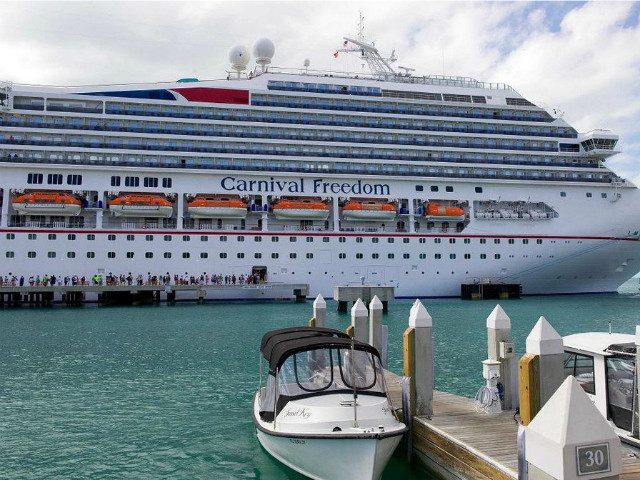Carnival Cruises is facing legal action for enacting a ban on American citizens born in Cuba from purchasing tickets to their debuting voyage around the island of Cuba, a restriction which a court may find violates the 1964 U.S. Civil Rights Act.
Cuban-Americans in Florida convened earlier this week to protest the corporation’s decision to indulge discriminatory Cuban law by respecting the ban, a product of a Cuban law that prohibits Cuban-Americans from reaching the island by sea (approved Cuban-Americans can legally enter Cuba by air. Havana bans Cubans from entering the United States with few exceptions).
Holding signs reading “no to apartheid” and “Carnival: Go but don’t discriminate,” the protesters urged the cruise line to cancel its scheduled trips to Cuba on its “Fathom” line, which promises to show tourists “the real Cuba from the inside.” The group, organized by the Democratic Movement, a Cuban-American human rights organization, convened before Carnival Cruise’s headquarters in Doral, Florida, to call for Carnival to cancel its cruises to the island until it can legally accommodate all passenger regardless of national origin.
The protesters argue that doing business with Cuba funnels millions of dollars into an oppressive regime that later uses the funds to pay police officers to arbitrarily detain, beat, and torture pro-democracy protesters on the island. “They wind up not just investing economically, but becoming partners with the dictatorship in repression and discrimination,” Orlando Gutierrez of the Cuban Democratic Directorate group told reporters.
Two Cuban-Americans have sued Carnival Cruises after being denied tickets for purchase due to their country of birth. Francisco Marty tells reporters that he was hoping to sail on the cruise with his family because he cannot fly into Cuba for health reasons. “I wanted to go back to see my native country and share its culture with a surprise trip with my children, but Carnival will not allow my Cuban-born daughter and me to go on its ship,” he said in a statement.
The lawsuit argues, as Breitbart News detailed last week, that not allowing customers to purchase tickets to a cruise based on where they were born is a violation of the 1964 Civil Rights Act, which prevents “places of public accommodation” from discriminating on the basis of “race, color, religion, or national origin.” The law hinges on whether a cruise ship is a “place of public accommodation.” In a recent case involving a violation of the Americans with Disabilities Act (ADA), courts found that cruise ships sailing internationally are still beholden to federal discrimination law because they use American ports.
“This has already been decided and Carnival knows about this,” plaintiff attorney Robert Rodriguez told the Miami Herald. “We are just hoping that [Carnival Corp.] has the wherewithal to know that No. 1, it is legally incorrect, and also more importantly, morally incorrect.” Rodriguez is comparing the case to the Kuwait Airways ban on Israeli citizens from their flights, arguing that Kuwaiti law does not recognize Israel as a state. Kuwait Airways was forced to cancel flights out of New York, refusing to abide by American law.
Carnival has responded to the lawsuit by alleging that they had no choice but to abide by Cuban law. “We have requested a change in the regulation and are actively working on the issue. It is our hope and intention that everyone can travel and we will continue to pursue a change in the regulation that puts cruising on the same footing as aircraft travel is today in Cuba,” Carnival spokesman Roger Frizzell said in a statement.
Critics reject this argument, suggesting that the cruises can wait if Carnival believes it has the power of persuasion to convince communist Cuba to change its policy. “If the corporation, as it said, was negotiating with Havana to get the Cuban regime to retire this requirement, it should have continued to do so until succeeding before agreeing to violate the laws of the United States,” the Foundation for Human Rights in Cuba, an NGO, said in a statement.
Cuban-American legislators have reacted with disgust. “Make no mistake — by discriminating against Cuban-Americans, Carnival is allowing the Castro regime to extend its oppressive reach to our shores,” Sen. Robert Menendez said of the new cruises. “I’m not a lawyer, but I think it merits looking into because we’re discriminating against people based on where they were born,” Florida Congresswoman Ileana Ros-Lehtinen said of the lawsuit.
The two Cuban-American senators running for president this year, Sen. Marco Rubio and Sen. Ted Cruz, have yet to weigh in. Sen. Rubio is currently working on a bill to deny Cuban refugees refugee status in the United States.
Secretary of State John Kerry has condemned Carnival Cruises for doing business with Cuba. “We should not be in a situation where the Cuban government is forcing its discrimination policy on us,” he said while visiting Miami on Friday.
Carnival’s “Fathom” line is scheduled to set sail on May 1, a Marxist holiday celebrated by Friedrich Engels and Vladimir Lenin known as “International Workers’ Day.” Tickets fetch for more than twice the average price of a cruise to the Caribbean Sea.

COMMENTS
Please let us know if you're having issues with commenting.